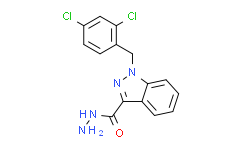| Cas No.: | 252025-52-8 |
| Chemical Name: | 1-(2,4-Dichlorobenzyl)-1H-indazole-3-carbohydrazide |
| Synonyms: | 1-(2,4-Dichlorobenzyl)-1H-indazole-3-carbohydrazide;AF-2364;Adjudin;1-[(2,4-Dichlorophenyl)methyl]-1H-indazole-3-carboxylic acid hydrazide;AF 2364 |
| SMILES: | O=C(C1=NN(CC2=CC=C(Cl)C=C2Cl)C3=C1C=CC=C3)NN |
| Formula: | C15H12N4OCl2 |
| M.Wt: | 335.18798 |
| Purity: | >98% |
| Sotrage: | 2 years -20°C Powder, 2 weeks 4°C in DMSO, 6 months -80°C in DMSO |
| Description: | Adjudin is an extensively studied male contraceptive with a superior mitochondria-inhibitory effect. Adjudin is also a potent Cl- channel blocker. |
| Target: | Cl- channel[1] Mitochondria[2] |
| In Vivo: | To determine whether Adjudin can inhibit lung and prostate cancer growth in vivo, the effect of Adjudin is tested in a subcutaneous model of lung and prostate cancer. Human lung carcinoma cells A549 and prostate carcinoma cells PC3 are injected into athymic nude mice subdermally at the lower back site respectively. Mice are then randomized into two treatment groups with similar mean tumor sizes: Adjudin and vehicle (control). Approximately 2 weeks after tumor inoculation Adjudin is injected intraperitoneally once every three days in lung carcinoma cells and every other day in prostate carcinoma cells at 100 mg/kg. Adjudin treatment can be well tolerated in rodent. And Adjudin-treated mice show significant tumor growth inhibition compared with the control group (P<0.0001 in the human lung carcinoma cells A549 and P=0.006 in the prostate carcinoma cells PC3)[3]. |
| In Vitro: | Adjudin is a potent blocker of Cl- channels: disrupting Cl- ion transport function results in a decline in sperm capacitation and fertilizing ability in humans in vitro[1]. Adjudin (ADD) is a mitochondria inhibitor[2]. Adjudin is a molecule that mediates adherens junction disruption at the Sertoli-germ cell interface. To investigate the effect of Adjudin on cancer cells, more than ten different types of human or mice cancer cell lines are treated with increasing concentrations of Adjudin and the cell proliferation is measured by the modified MTT assay. Adjudin inhibits cell proliferation in a dose dependent manner in SGC-7901 (human gastric adenocarcinoma cell), MDA-MB-231 (human breast adenocarcinoma cell), Smmc-7721 (human hepatoma cell) and MIA Paca-2 (human pancreatic adenocarcinoma cell) cells. The IC50 of Adjudin is determined to be 58.0 µM, 13.8 µM, 72.3 µM and 52.7 µM against SGC-7901, MDA-MB-231, Smmc-7721 and MIA Paca-2 cells, respectively, after treatment for 24 h. Similar results are obtained in other human and mice cancer cell lines. The IC50 of Adjudin in A549 cells and PC3 cells is 63.1 µM and 93.0 µM, respectively. For WI-38 and BPH-1 cells, the IC50 of Adjudin can be observed at more than 300 µM and 200 µM, respectively, which is about 5 times and 2 times more than that for the cancer cell lines A549 and PC3[3]. |
| Cell Assay: | To determine whether Adjudin can inhibit lung and prostate cancer growth in vivo, the effect of Adjudin is tested in a subcutaneous model of lung and prostate cancer. Human lung carcinoma cells A549 and prostate carcinoma cells PC3 are injected into athymic nude mice subdermally at the lower back site respectively. Mice are then randomized into two treatment groups with similar mean tumor sizes: Adjudin and vehicle (control). Approximately 2 weeks after tumor inoculation Adjudin is injected intraperitoneally once every three days in lung carcinoma cells and every other day in prostate carcinoma cells at 100 mg/kg. Adjudin treatment can be well tolerated in rodent. And Adjudin-treated mice show significant tumor growth inhibition compared with the control group (P<0.0001 in the human lung carcinoma cells A549 and P=0.006 in the prostate carcinoma cells PC3)[3]. |
| Animal Administration: | Mice[3] The male BALB/C nude mice weighing ~20g are equally implanted with A549 cells (0.5×107 cells) containing 3 mg/mL of matrigel and PC3 cells (1×106 cells) hypodermically. After 2 weeks, the mice with palpable tumors are divided into two groups (n=4 per group in each experiment and repeated with a total of three experiments): i.p. injection of Adjudin which is dissolved in corn oil from a DMSO stock solution with final administered quantity at 100 mg/kg (~300 µM used in vitro); the equivalent vehicle control group are administered with the same amount of corn oil and DMSO via i.p. injection. Adjudin or vehicles are administered every three day in A549 and every other day in PC3 up to 2 weeks. Tumor volumes are determined and calculated. |
| References: | Mice[3] The male BALB/C nude mice weighing ~20g are equally implanted with A549 cells (0.5×107 cells) containing 3 mg/mL of matrigel and PC3 cells (1×106 cells) hypodermically. After 2 weeks, the mice with palpable tumors are divided into two groups (n=4 per group in each experiment and repeated with a total of three experiments): i.p. injection of Adjudin which is dissolved in corn oil from a DMSO stock solution with final administered quantity at 100 mg/kg (~300 µM used in vitro); the equivalent vehicle control group are administered with the same amount of corn oil and DMSO via i.p. injection. Adjudin or vehicles are administered every three day in A549 and every other day in PC3 up to 2 weeks. Tumor volumes are determined and calculated. |






















